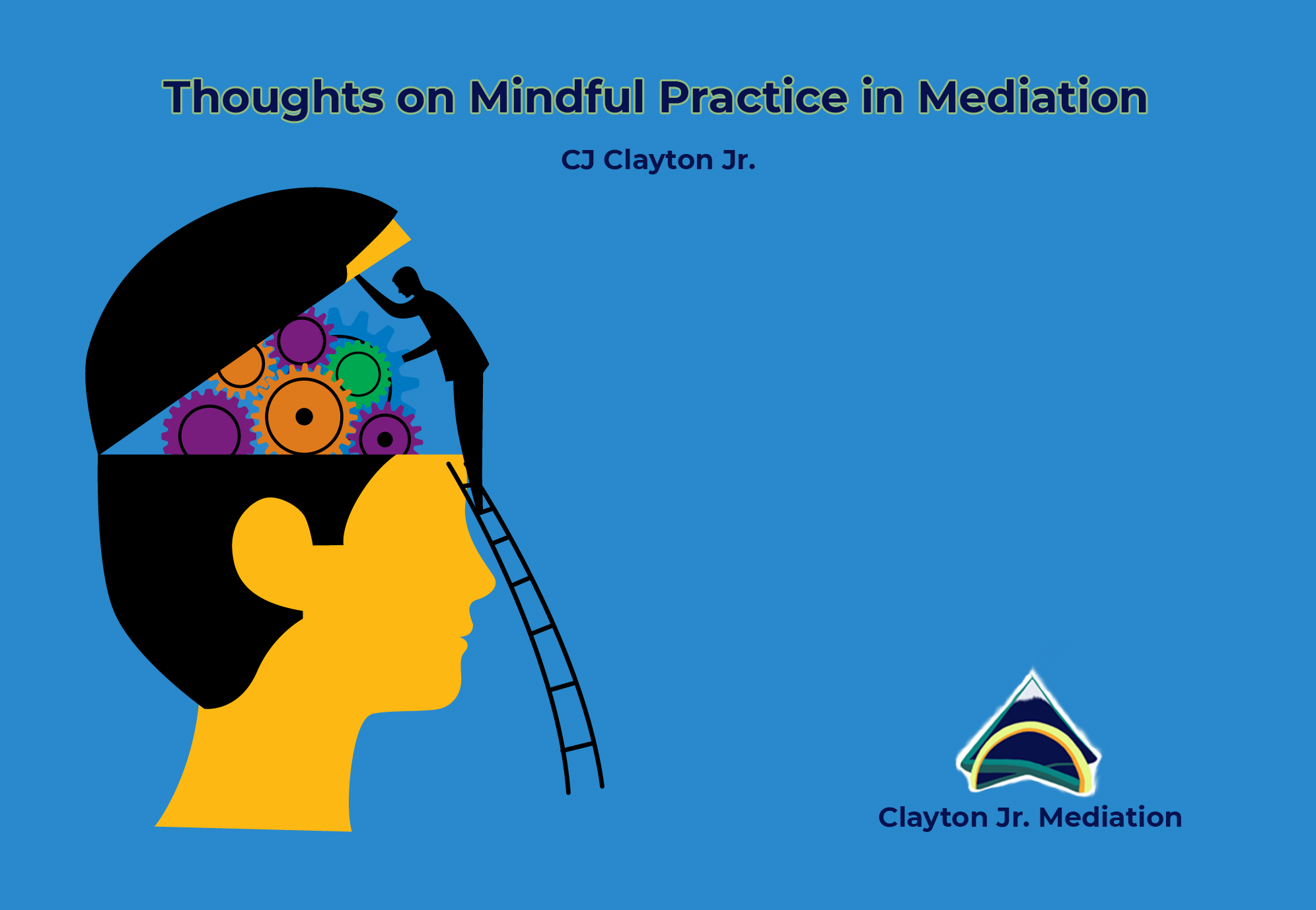
On reflection, personal experiences reveal an important relationship between our overall well-being and how we carry out certain practices. When we’re burdened by arising life circumstances, for example, it may be harder to conduct certain processes successfully. On the other hand, an abundance of energy often makes focusing difficult. Innate awareness that can add significant value to our practices is seemingly under-attack on a daily basis due to a host of challenges. One concept referred to as mindful practice is cited in the following writing, specifically to demonstrate how it can be a helpful response to such problems. It’s broadly noted that the designation is observationally empirical while unconventional, theoretical, and abstract in nature. Collectively, mindful practice warrants examining what kind of impact it can have for mediation practitioners. It is concluded here that a mediator’s ability to obtain and hold mindful practice enables them to achieve greater prowess in general. The modality may be linked to certain standards for practitioners and derived through a variety of individual pursuits. Mindful practice allows mediators to activate deep introspection on their work and yield subsequent positive-adaptation in the present, near-term, and long-term. The significance of discussing mindful practice with respect to mediation work is paramount for many reasons — in particular, it may reveal pathways to developing beneficial mediation methods, functions, and qualities. A mediator’s role is often complex and demanding. There are many obstacles to maintaining optimal performance and fulfillment — mindful practice appears to provide assistance with overcoming those challenges.
The topic of mindfulness falls into many different domains and may be understood differently from person-to-person. Being mindful generally means having awareness or respect for others and ourselves although that definition may be somewhat limited. Similarly, it is worthwhile to recognize and embrace the intricateness behind the what, why, and how of mindful practice, specifically for mediation practioners in this case. With respect to “how”, there seem to be multiple pathways worth pointing to. While some mediators may hone in on a proper balance of sleep, nutrition, and exercise, others might highlight their commitment to particular moral, psychological, philosophical, and otherwise value-centered principles and practices. These are just a few examples, and of course, it may be a balance of such activities that invokes mindful practice for some practitioners. It is reasonable to state that there exists some disagreement about the how is done. Perhaps this observational claim gives some weight to the suggestion that building and keeping a mindful practice is best left up to the practitioner. Freedom of choice appears to be an important precursor to having ownership over it. Even if a mediator chooses to seek out some type of mindful practice mentorship, and advice thereof, it still places the responsibility on the individual practitioner to work towards achieving mindful practice. To be clear, this is not to say that group-oriented endeavors cannot feed mindful practice. Indeed, many do appear to provide help in that way; however, being able to individually-choose certain activities (group or personal) is seemingly fundamental when it comes to building and maintaining a mindful practice.
Curiosity surfaces when attempting to highlight commonly-accepted valuable outputs for mindful practice in mediation. A good place to start is to look at how practitioners hold themselves. Specifically, concerning demeanor, it’s reasonable to think that mediators conducting their work clearly, calmly, and sturdily are more likely to be engaging with mindful practice. Additionally, the ability to communicate well whereas by having sufficient patience and listening is something we generally associate with being an effective mediator. It makes sense when applying these characteristics to the role of mediators — that is, third-party neutrals dedicated to helping parties find mutually-acceptable solutions. This line-of-thought gives some weight to the “what” and “why” of mindful practice in mediation. In whole, it puts forward the notion that individual mediation practitioners may carefully examine what allows them to tap into mindful practice while evaluating their ability to uphold commonly-recognized positive outputs. Therefore, this enables a process of reflection and adaptation that allows mediators to evolve in valuable ways with the help of mindful practice.
Furthering the conceptual accessibility of mindful practice in mediation, we might link mindful practice to the possession of other skills and desirable qualities for practitioners. For instance, we might add to the list empathy, thoughtfulness, detail-orientedness, critical-thinking, creativity, and neutrality. In short, mindful practice seemingly provides pathways to having these skills and qualities. That is, they can be developed whereby mindful practice enables mediators to focus on certain important principles and to take a step back from individual perspectives. “Seeing the bigger picture” is a critical task for mediation practitioners in that their role involves understanding differing viewpoints and encouraging parties to legitimately consider and work towards consensus building. Being able to effectively apply this method often leads to strengthening a mediator’s ability to demonstrate and invoke adaptation and flexibility. Consequently, mindful practice can invite greater self-introspection and allow mediation practitioners to step back from chaotic situations with greater ease. Therefore, engaging in self-evaluative methods via mindful practice may allow mediators to be more unattached, flexible, and duty-driven conduits of facilitative communication. This rather abstract sounding balance is actually something quite worthy of striving for in the practical sense for mediators.
Many activities that yield mindful practice appear to restore key physical and mental faculties. Not only does this allow mediators to be more detail-oriented and focused, but also encourages them to identify a stronger contentment, passion, and appreciation for their work. This is imperative given that it increases the likelihood that a mediator is bringing their best-self into the process. Further, it seems that being in-tune to that end typically results in having greater authenticity as a practitioner. Broadly, the parties in mediation are capable of recognizing a genuine approach and receive authenticity well. Inversely, mediators may be viewed as overly self-interested or as failing to connect on a human level. Having sincere empathy creates trust and cooperation in the process of mediation. The idea here is that practitioners demonstrating legitimate care and authenticity are more likely to invoke respect and buy-in from parties. Additionally, people can struggle with bias and mediators are no different. Upholding an impartial and neutral approach isn’t always easy. To that end, holding a mindful practice may encourage mediators to be more focused on helping others reach resolution in an equitable and creative manner rather than trying to dominate the process with personal views. There is a time and place for problem-solving as a mediator, but ultimately, the practice is about helping the parties, not the mediator.
Perhaps one of the single most important benefits of mindful practice for mediators is that it can create greater accountability whereby beginning with the practitioner and successively spreading to the participants. Mindful practice seems to have the power to accomplish this simply because enhancing mental and physical well-being allows for a greater capacity to handle key responsibilities. Parties often enter into mediation in the first place due to a lack of accountability stemming from a variety of factors. It is therefore vital that a mediator works towards bringing about the opposite and will find it more difficult to do so if they are not accountable individually. Mediation demands that practitioners be detail-oriented and adaptable. The role of a mediator usually entails walking a careful balance between process-facilitation and building relationships with accountability through dynamic communication processes. Conflicts often involve important decisions that demand accountability from practitioners and participants such that decision-making process are done clearly, thoughtfully, and thoroughly. I’ve come to think that mindful practice can be useful in holding mediation practitioners to that standard — the demonstration of this criterion can be influential and thereby beneficial to mediation processes.
It’s noteworthy to point out that building mindful practice comes with its own set of obstacles for mediators. One difficult hurdle is simply finding enough time. In general, prioritizing certain practices and events can be a formidable task. Further, an optimal life-work balance may be hard to achieve given factors such as time. Establishing a consistent mindful practice comes with experience. It seems that trial and error can provide value for mediation practitioners when it comes to identifying which pursuits will help them to obtain mindful practice and how to continually maintain it. It makes sense that having dedication to mindful practice is an important part of holding the kind of prowess, well-being, and contentment discussed so far. This is, in large-part, because mediators are susceptible to the chaotic and overwhelmed state-of-being as mentioned and must work towards the opposite. To use a metaphor, mindful practice is like a protective shield for mediation practitioners although its possession requires commitment and maturation. Similarly, a common challenge to effective mediation is stress — both mediators and parties can be challenged by stress. A major root cause of shared-stress may be legal time constraints and coercive actions that can induce feelings like anxiety. This is a good reason why mediators need to be able to separate themselves from strong emotional dispositions while remaining focused on the subject of their work. If not handled accordingly, such factors can cause parties and practitioners to drop the ball on critical-thinking, creativity, and thoroughness. Mindful practice aides mediation practitioners thereof by helping them to utilize practical counteractive methods that strengthen discernment, patience, and otherwise mental wisdom.
Lastly, let’s discuss two more valuable outputs of mindful practice for mediators: humility and confidence. Some consideration was given to humility like tendencies in earlier paragraphs. For instance, it was noted that mindful practice may help mediation practitioners to develop an empathetic and authentic approach towards helping all parties in dispute resolution processes. In short, it seems that mindful practice can enable a sort of compassion and understanding for others which surfaces humility. The claim here is not that mindful practice creates completely selfless mediators. That’d be a difficult statement to defend for many apparent reasons. However, increasing the likelihood that practitioners will respond to mediation work with neutrality, humility, empathy, etc. is a worthwhile and realistic goal. It can be rationally assumed that hitting such a target takes the right kind of commitment to certain practices and modes of self-development — hence, the usefulness of mindful practice. Additionally, using appropriate body language and tone is often cited as an important function for mediation practitioners. It might be said that confidence is contagious. Much like accountability, when mediators lead with confidence, it too will likely be well-recieved and positively influence every side of the mediation table. Concerning the role of a mediator, it is important to keep in mind that a confident demeanor should be in line with other important qualities and skills. That is, the idea is not to use confidence to put forth domination, control, or manipulation. Those tactics might force agreement in some cases but will not be truly representative of a principled resolution process that can pass the test of time and ethics. Mindful practice seems to instill proper confidence in mediators by encouraging adherence to the kind of beneficial qualities and skills discussed in the writing at hand — practioners can remain confidently optimistic for the right reasons irrespective of potential outcomes. To that end, mindful practice may bring about the valuable “here and now” type of environment that leads to opening doors.
CJ Clayton Jr.
10/01/2019
